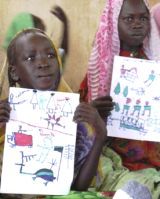UN dissolves body charged with monitoring Darfur abuses
December 14, 2007 (GENEVA) — The U.N. Human Rights Council on Friday dissolved a group of experts tasked with monitoring abuses in Darfur after demands from African countries to ease the political pressure on Sudan.
 The unanimous decision to halt the mission of the seven rights experts comes a week after the group accused Sudan of failing to protect civilians in Darfur from rape, torture and other forms of violence.
The unanimous decision to halt the mission of the seven rights experts comes a week after the group accused Sudan of failing to protect civilians in Darfur from rape, torture and other forms of violence.
The task of overseeing Khartoum’s progress in protecting human rights in Darfur will now fall to the U.N.’s special envoy to Sudan, Simar Samar, whose mandate was unanimously extended for a year.
Rights groups condemned the decision not to renew the group’s mandate.
“There has been an unacceptable compromise by the council on the issue of Darfur,” Julie de Rivero of the New York-based Human Rights Watch told reporters.
“We feel that Sudan has been rewarded for its obstruction and its failure to implement recommendations” made by the expert group, she said.
European officials expressed satisfaction at the decision, noting Samar would be able to continue working.
One senior European diplomat, who briefed reporters on condition of anonymity, said the council would continue to engage Sudan.
But de Rivero said negotiations this week between the main blocs within the council – the European Union, African states and the Organization of the Islamic Conference – appeared to have been aimed at appeasing the government of Sudan and its allies.
More than 2.5 million people have been displaced and more than 200,000 people have died as a result of the four-year conflict between the region’s ethnic African rebels and the Arab-dominated Sudanese government and its militia allies.
In March a U.N. fact-finding mission led by U.S. Nobel laureate Jody Williams said the government of Sudanese President Omar al-Bashir had orchestrated militia attacks against civilians. The Arab- and Muslim-dominated rights council rejected the recommendations of Williams’ team, voting instead to create the expert group it has now dissolved.
The council also agreed Friday to send its U.N. special investigator for Myanmar back to the Southeast Asian country for a follow-up to his visit last month.
Paulo Sergio Pinheiro, a Brazilian professor, last week released a report on his trip in which he accused Myanmar’s military-led government of downplaying the number of people killed in the September crackdown against pro-democracy demonstrators.
Pinheiro’s report found that at least 31 people were killed – more than double the number acknowledged by authorities.
The council also extended by three years the mandate of its independent investigator on human rights in the fight against terrorism.
Martin Scheinin, a Finnish professor, has been highly critical of U.S. practices in combating terrorism, in particular the use of military commissions to try detainees at Guantanamo Bay.
A resolution to extend the mandate of the council’s expert on freedom of religion was opposed by Muslim countries but passed after a vote of 29-0 in favor, with 18 abstentions.
Muslim countries had demanded changes to the resolution to bring it in line with Islamic law, which forbids religious conversion, but were unable to muster sufficient support for their position.
(AP)
On the net:
U.N. Human Rights Council:
